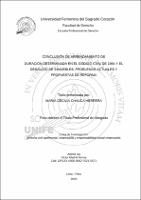| dc.contributor.advisor | Madrid Horna, Victor | |
| dc.contributor.author | Chauca Herrera, Maria Cecilia | |
| dc.date.accessioned | 2023-06-07T20:38:38Z | |
| dc.date.available | 2023-06-07T20:38:38Z | |
| dc.date.issued | 2023 | |
| dc.identifier.uri | http://hdl.handle.net/20.500.11955/1129 | |
| dc.description.abstract | La presente tesis se ha desarrollado en base al análisis jurídico de la normativa civil y procesal civil que regulan tanto el momento de la conclusión del arrendamiento de duración determinada, como la continuación del arrendamiento con plazo vencido, y el desalojo de inmuebles por vencimiento de dicho plazo. Aplicando los métodos de interpretación analítico y sistemático a la normativa civil y procesal civil que regulan los temas antes mencionados, se ha podido determinar la incorrecta interpretación que a nivel procesal se le ha dispensado tanto al artículo 1700 del Código Civil, que regula la continuación de un arrendamiento concluido, como a la remisión de una carta notarial al arrendatario que se mantiene en uso del inmueble, requiriéndole la restitución del mismo, que según el IV Pleno Casatorio Civil, convierte una posesión inmediata en una posesión precaria, asumiendo por ello ─los operadores judiciales─, que el ex arrendatario convertido en precario solo puede ser demandado por dicha causal. Por lo antes expuesto y en tanto no se derogue dicho artículo 1700 del Código Civil, urge que la Corte Suprema en nuevo Pleno Casatorio Civil, aplicando los métodos de interpretación antes citados, modifique dicha interpretación, estableciendo que el único efecto que produce el artículo 1700 mencionado, es convertir un arrendamiento de duración determinada en uno de duración indeterminada, al que se le pone fin desde la remisión de una carta notarial, siendo la causal de desalojo por vencimiento de plazo, la única que corresponde. | es_PE |
| dc.description.abstract | This thesis has been developed based on the legal analysis of the civil and civil procedural regulations that regulate both the moment of the conclusion of the fixed-term lease, the continuation of the lease with an expired term, as well as the eviction of real estate due to the expiration of said term. Applying the analytical and systematic methods of interpretation to the civil and civil procedural regulations that regulate the aforementioned issues, it has been possible to determine the incorrect interpretation that at the procedural level is given to both article 1700 of the Civil Code, which regulates the continuation of a concluded lease, as well as the remission of a notarized letter to the tenant who remains in use of the property, requiring the restitution of the same, which according to the IV Plenary Civil Cassation, converts an inmediate possession into a precarious possession, assuming therefore the judicial operators, that the former tenant turned precarious can only be sued for said cause. Due to the foregoing and as long as said article 1700 of the Civil Code is not repealed, it is urgent that the Supreme Court in a new Civil Cassation Plenary, applying the aforementioned methods of interpretation, modify said interpretation, establishing that the only effect produced by article 1700 mentioned, is to covert a fixed-term lease into one of indefinite duration, which is terminated from the remission of a notarial letter, being the cause of eviction due to expiration of the term, the only one that corresponds. | es_PE |
| dc.description.uri | Tesis | |
| dc.format | application/pdf | es_PE |
| dc.language.iso | spa | es_PE |
| dc.publisher | Universidad Femenina del Sagrado Corazón | es_PE |
| dc.rights | info:eu-repo/semantics/openAccess | es_PE |
| dc.rights.uri | https://creativecommons.org/licenses/by-nc-nd/4.0/ | es_PE |
| dc.source | Repositorio Institucional - UNIFE | |
| dc.subject | Derecho--Tesis | es_PE |
| dc.subject | Arrendamiento | |
| dc.subject | Desahucio | |
| dc.subject | Leases | |
| dc.subject | Eviction | |
| dc.title | Conclusión de arrendamiento de duración determinada en el Código Civil de 1984 y el desalojo de inmuebles: problemas actuales y propuestas de reforma | es_PE |
| dc.type | info:eu-repo/semantics/bachelorThesis | es_PE |
| thesis.degree.name | Abogada | es_PE |
| thesis.degree.grantor | Universidad Femenina del Sagrado Corazón. Facultad de Derecho | es_PE |
| thesis.degree.level | Título Profesional | es_PE |
| thesis.degree.discipline | Derecho | es_PE |
| dc.subject.ocde | https://purl.org/pe-repo/ocde/ford#5.05.01 | es_PE |
| renati.advisor.dni | 06282749 | |
| renati.advisor.orcid | https://orcid.org/0000-0002-7021-5571 | es_PE |
| renati.author.dni | 21415177 | |
| renati.discipline | 421016 | es_PE |
| renati.juror | Romero Antola, Mario Remo | es_PE |
| renati.juror | Montes de Oca Vidal, Alipio | es_PE |
| renati.juror | Madrid Horna, Victor | es_PE |
| renati.level | http://purl.org/pe-repo/renati/level#tituloProfesional | es_PE |
| renati.type | http://purl.org/pe-repo/renati/type#tesis | es_PE |
| dc.publisher.country | PE | es_PE |
| dc.description.lineadeinvestigacion | Derecho Civil Patrimonial, Empresarial y Responsabilidad Social Empresarial | es_PE |


